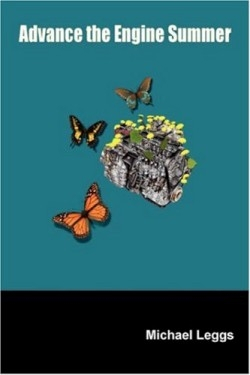Advance the Engine Summer
This poetry isn’t what you’d expect from a rock singer; there’s no sex, no drugs, and very little mention of music. The collection includes some fifty poems divided into six sections, roughly by subject, with Latin or pseudolatin titles (this reviewer’s rough translations in parentheses): Anima (Soul), Imaginatio (Of Imagination), Conjunctio (Of Coming Together), Canaria (Of Dogs), Circumiecti (Circular Travels), and Doctrinae (Doctrines). It is unclear why he chose Latin; like some of his language choices, it seems a little out of place, though charming in the case of the dogs section.
Leggs’ most concrete poems are his strongest; his work most needs to mature past a tendency toward slightly affected language and abstraction. Several pieces in this collection are brilliant in concept and even have some successful lines, but are ultimately deeply flawed in their execution as a result of this weakness, notably “Winter on the Canine Internet,” the intriguing Liturgy, “I Was A Supercollider,” and “Radioactive Showhorse Design,” the last of which contains a memorable image of:
A crowd of skeletons […]
on melted, torn cushions
in the stands.
Their eye sockets whistle.
Their heads fill with rain.
Weaker pieces, especially “Karmic Flight School Mid-Term Project,” “Dodecaphonic High-Rise Disaster,” “The History of Black,” and “Reply,” fall further short of his mark. Ultimately these stragglers are hamstrung by language that feels strangely alien to the genuine voice of this writer. Virginia Woolf’s essay about writers adopting styles unsuited to them may be particularly instructive for Leggs. Woolf gives an example of the style current in the nineteenth century and writes, Charlotte Brontë…stumbled and fell with that clumsy weapon in her hands. George Eliot committed atrocities with it that beggar description. Jane Austen looked at it and laughed at it and devised a perfectly natural, shapely sentence proper for her own use… Leggs is working toward expressing his unique voice without being choked by the impedimenta which can trip up new poets attempting to learn by trying on other writers’ habits of expression. Experimenting with the rigors of form and comparing his less effective pieces with his stronger ones may prove instructive.
Thought-provoking and amusing, “The Death of Albert Flynstein,” is the most memorable poem in the book, although its execution (no pun intended) leaves something to be desired. There’s also a bit of padding at the beginning, but a little revision should make that right. Another standout is “How to Install Hunger 2.0.” The strongest poem in the entire collection is one of the simplest, and can be improved simply by exchanging the word around for about:
She Wears Cotton Balls Between Her Toes
like delicate fluffs of snow.
Each morning when we rise,
they lie scattered
about the bedroom floor
refusing to melt.
It bodes well for Leggs’ development as a writer that so many of his poems are humorous, intellectually interesting, or both, and that he is capable of conjuring some striking images. One would hope that, regardless of the success of this volume, he continues to study and strive to further develop his literary skills.
Disclosure: This article is not an endorsement, but a review. The publisher of this book provided free copies of the book and paid a small fee to have their book reviewed by a professional reviewer. Foreword Reviews and Clarion Reviews make no guarantee that the publisher will receive a positive review. Foreword Magazine, Inc. is disclosing this in accordance with the Federal Trade Commission’s 16 CFR, Part 255.

